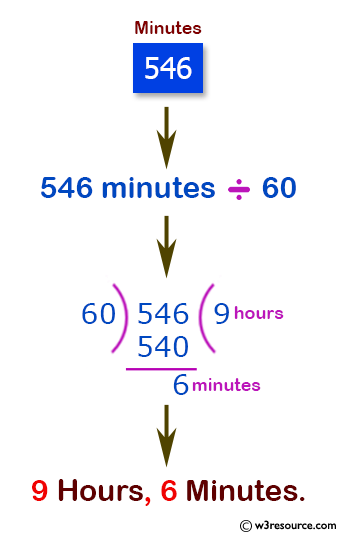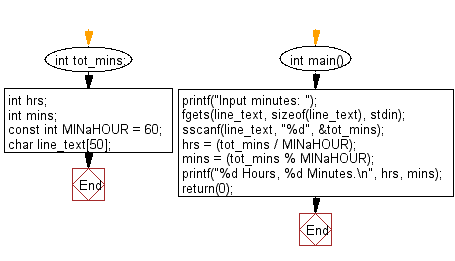C Exercises: Calculate the total number of hours and minutes
C Input Output statement and Expressions: Exercise-6 with Solution
Write a program in C that takes minutes as input, and display the total number of hours and minutes.
Pictorial Presentation:

Sample Solution:
C Code:
#include <stdio.h>
int tot_mins; /* given number of minutes */
int hrs; /* number of hours (to be computed) */
int mins; /* number of minutes (to be computed) */
const int MINaHOUR = 60; /* number of minutes in an hour */
char line_text[50]; /* line of input from keyboard */
int main() {
printf("Input minutes: ");
fgets(line_text, sizeof(line_text), stdin);
sscanf(line_text, "%d", &tot_mins);
hrs = (tot_mins / MINaHOUR);
mins = (tot_mins % MINaHOUR);
printf("%d Hours, %d Minutes.\n", hrs, mins);
return(0);
}
Sample Output:
Input minutes: 546 9 Hours, 6 Minutes.
Flowchart:

C Programming Code Editor:
Improve this sample solution and post your code through Disqus.
Previous: Write a C program that takes hours and minutes as input, and calculates the total number of minutes.
Next: Write a program in C that reads a firstname, lastname and year of birth and display the names and the year one after another sequentially.
What is the difficulty level of this exercise?
Test your Programming skills with w3resource's quiz.
C Programming: Tips of the Day
Static variable inside of a function in C
The scope of variable is where the variable name can be seen. Here, x is visible only inside function foo().
The lifetime of a variable is the period over which it exists. If x were defined without the keyword static, the lifetime would be from the entry into foo() to the return from foo(); so it would be re-initialized to 5 on every call.
The keyword static acts to extend the lifetime of a variable to the lifetime of the programme; e.g. initialization occurs once and once only and then the variable retains its value - whatever it has come to be - over all future calls to foo().
Ref : https://bit.ly/3fOq7XP
- New Content published on w3resource:
- HTML-CSS Practical: Exercises, Practice, Solution
- Java Regular Expression: Exercises, Practice, Solution
- Scala Programming Exercises, Practice, Solution
- Python Itertools exercises
- Python Numpy exercises
- Python GeoPy Package exercises
- Python Pandas exercises
- Python nltk exercises
- Python BeautifulSoup exercises
- Form Template
- Composer - PHP Package Manager
- PHPUnit - PHP Testing
- Laravel - PHP Framework
- Angular - JavaScript Framework
- Vue - JavaScript Framework
- Jest - JavaScript Testing Framework
